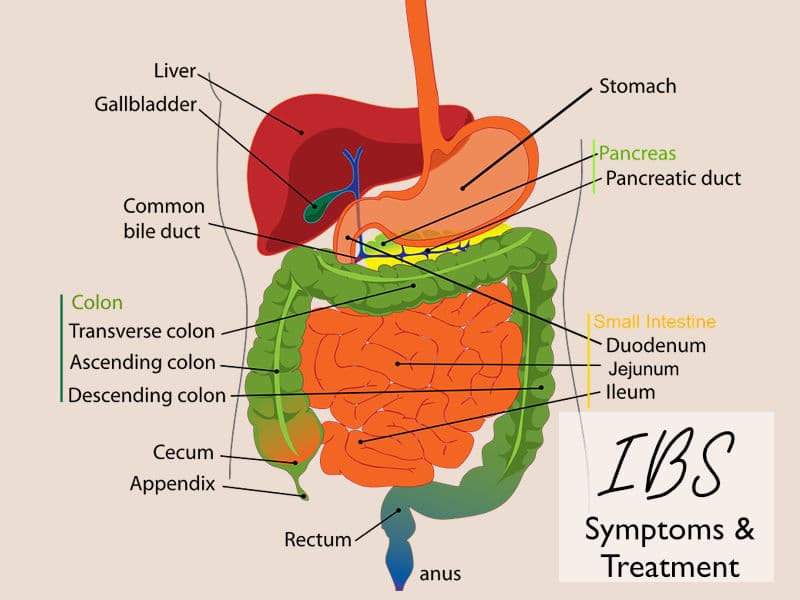
Are you dying to eat Aunt Martha’s Chocolate Turtle Cheesecake but know that you’ll have to excuse yourself before you take the last bite because your stomach is going to bloat up to painful proportions? (Not to mention the urgent pitstop that will be required on the drive home.) If this scenario sounds familiar, you may well be wondering about IBS symptoms and treatment.
And you may indeed have Irritable Bowel Syndrome – usually referred to as IBS. But let’s talk about it first, so you can decide the best way forward for you.
What is Irritable Bowel Syndrome?
IBS is exactly what it sounds like – your bowel is constantly irritated, causing a whole host of inconvenient and uncomfortable symptoms.
Irritable bowel syndrome is a gastrointestinal disorder that is defined by the presence of a cluster of symptoms and signs, including cramping, abdominal pain, increased gas, altered bowel habits, food intolerance, and bloating (distention). Both adults and children can suffer from IBS. And it’s usually chronic rather than short term.
IBS Symptoms
The symptoms of IBS are a combination of stomach issues, abdominal pain, and problems evacuating. They include:
- Abdominal pain
- Cramping
- Urgent bowel movements
- Diarrhea and loose stools
- Constipation
- Increased gas
- Abdominal swelling or bloating
- Cramping pain after eating certain foods
- Nausea
- Mucousy or foamy stools
- Unexplained weight loss
- Loss of appetite
In addition, nearly 70% of people with IBS also experience indigestion even though it’s not technically a symptom of IBS.
Most often, symptoms are relieved by having a bowel movement.
If you already suspect you have IBS symptoms and know you want help with treatment, call us today. If you want to know about causes, diagnosis, and how we might help relieve your symptoms with treatment, read on!
Causes of IBS
The exact cause of IBS is unknown. However, IBS is a functional disorder, meaning the digestive tract no longer functions properly. Factors that can cause IBS flare-ups include
- alteration in the gastrointestinal (GI) tract motility (or muscular action)
- abnormal nervous system signals
- increased sensitivity to pain
- food intolerances
- food allergies
- gastroenteritis (“stomach flu” or “stomach bug”)
- psychological conditions such as anxiety or depression
- hormone or neurotransmitter imbalance
- hormone imbalance
- gut infection
- gut dysbiosis
- increased intestinal hyperpermeability (“leaky gut”)
- small intestinal bacterial overgrowth (SIBO)
IBS Diagnosis
Since IBS is a collection of symptoms rather than a specific condition, no lab tests can diagnose it. To diagnose you with IBS, your doctor will look at your symptoms and how often they occur.
They may also run tests to rule out conditions (such as a gluten intolerance) that have many of the same symptoms like:
- Food allergies
- Side effects from medications
- Infection
- Enzyme deficiencies
- Inflammatory bowel diseases
Your doctor may also run the following tests as part of the diagnosis process:
- Flexible sigmoidoscopy or colonoscopy to see if you have blockage or inflammation in your intestines
- X-Rays
- Upper endoscopy
- Blood tests to check for anemia, thyroid problems, and infection
- Stool tests
- An organic acid test
- Tests to check your bowel muscles
If symptoms associated with IBS occur weekly for 3 months – or less often for at least six months – and you’ve been cleared of other conditions, then your doctor will diagnose you with IBS.
IBS Treatments to Relieve Symptoms
IBS is not life-threatening, and it doesn’t increase the likelihood that you’ll get other colon conditions, like ulcerative colitis, Crohn’s disease, or colon cancer. But it is usually chronic, as we mentioned, and can have a drastic effect on your lifestyle. Many people with IBS are forced to miss work or school and can’t take part in daily activities the way they want to.
So – the good news is this: There are various ways to relieve IBS symptoms, but no single treatment works for everyone. Working with a doctor and functional nutritionist to find the right treatment plan is crucial if you want to get your life back under control.
The first thing to do is to learn what your triggers are.
Certain foods, medicines, the presence of gas or stool, and emotional stress can all trigger IBS flare-ups.
Diet and lifestyle changes can make a significant difference in the occurrence and severity of symptoms.
- Avoid caffeine and alcohol
- Eat plenty of fiber
- Drink at least three or four glasses of water per day.
- Relax
- Don’t smoke
- Get more exercise
- Learn how to reduce and manage stress in your life
- Limit or avoid consumption of gluten and dairy
- Eat small meals throughout the day
- Keep a food diary to figure out which foods trigger IBS symptoms
The second thing is to consider which medications and supplements can also help you manage IBS symptoms.
There is no “one size fits all” solution to IBS. It is best to work with a doctor and functional nutritionist to determine a personalized diet and supplement/medication protocol based on your individual IBS presentation. Your doctor can assess your symptoms and determine if further testing needs to be done in order to personalize your treatment plan.
When to Call Your Doctor About IBS Symptoms and Treatment
IBS can be tricky. Sometimes it’s challenging to figure out when it’s just an upset tummy or when it’s a bigger problem. So here’s a quick list of signs that you need to call your doctor:
- When you have an IBS symptom that lasts a long time
- If you get a new symptom
- If your pain is worse than usual
- When you have new pain
- If over-the-counter medications no longer work for diarrhea, gas, or cramping
- If a symptom bothers you
- When you become stressed out or anxious about a symptom
- If you have rectal bleeding
- If you’re losing or gaining weight for no reason
We totally understand that it can be intimidating to talk about the symptoms associated with IBS. So writing out a list of your symptoms and questions to ask your doctor can help make sure you cover everything at the appointment.
Here’s a helpful list of questions to ask your doctor when you go for your appointment.
- Could some other condition be causing these symptoms?
- Will keeping a diary of my IBS symptoms help?
- Should I take over-the-counter medications to control symptoms?
- Should I add more fiber to my diet? How much and what kind?
- What other dietary changes would you recommend? Should I consult a dietitian?
- Could exercise, relaxation therapy or counseling help my IBS?
- Should I take prescription medications to relieve symptoms?
- What tests would you recommend now or in the future?
- Are there any other approaches or IBS treatments I should know about?
- When should I come back for a follow-up appointment?
Are you ready to enjoy your life again? We’re here to help!
Contact us for a consultation today!

A Medical Director, and one of the first physicians to join the Nava Health & Vitality Center, Dr. Douglas Lord has made significant contributions to our Center and its founding principles. Dr. Lord has helped develop and implement the Nava Method™—Nava’s proprietary approach to total body wellness. He has also been instrumental in liaising with other expert practitioners to successfully implement Nava’s range of therapies, treatments, and products.